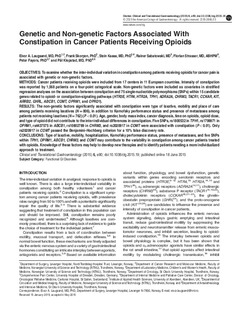Genetic and Non-genetic Factors Associated WithConstipation in Cancer Patients Receiving Opioids
| dc.contributor.author | Laugsand, Eivor Alette | |
| dc.contributor.author | Skorpen, Frank | |
| dc.contributor.author | Kaasa, Stein | |
| dc.contributor.author | Sabatowski, Rainer | |
| dc.contributor.author | Strasser, Florian | |
| dc.contributor.author | Fayers, Peter | |
| dc.contributor.author | Klepstad, Pål | |
| dc.date.accessioned | 2015-08-20T07:53:44Z | |
| dc.date.accessioned | 2016-04-21T14:14:51Z | |
| dc.date.available | 2015-08-20T07:53:44Z | |
| dc.date.available | 2016-04-21T14:14:51Z | |
| dc.date.issued | 2015 | |
| dc.identifier.citation | Clinical and Translational Gastroenterology 2015 | nb_NO |
| dc.identifier.issn | 2155-384X | |
| dc.identifier.uri | http://hdl.handle.net/11250/2386865 | |
| dc.description.abstract | Objectives: To examine whether the inter-individual variation in constipation among patients receiving opioids for cancer pain is associated with genetic or non-genetic factors. Methods: Cancer patients receiving opioids were included from 17 centers in 11 European countries. Intensity of constipation was reported by 1,568 patients on a four-point categorical scale. Non-genetic factors were included as covariates in stratified regression analyses on the association between constipation and 75 single-nucleotide polymorphisms (SNPs) within 15 candidate genes related to opioid- or constipation-signaling pathways (HTR3E, HTR4, HTR2A, TPH1, ADRA2A, CHRM3, TACR1, CCKAR, KIT, ARRB2, GHRL, ABCB1, COMT, OPRM1, and OPRD1). Results: The non-genetic factors significantly associated with constipation were type of laxative, mobility and place of care among patients receiving laxatives (N=806), in addition to Karnofsky performance status and presence of metastases among patients not receiving laxatives (N=762) (P<0.01). Age, gender, body mass index, cancer diagnosis, time on opioids, opioid dose, and type of opioid did not contribute to the inter-individual differences in constipation. Five SNPs, rs1800532 in TPH1, rs1799971 in OPRM1, rs4437575 in ABCB1, rs10802789 in CHRM3, and rs2020917 in COMT were associated with constipation (P<0.01). Only rs2020917 in COMT passed the Benjamini–Hochberg criterion for a 10% false discovery rate. Conclusions: Type of laxative, mobility, hospitalization, Karnofsky performance status, presence of metastases, and five SNPs within TPH1, OPRM1, ABCB1, CHRM3, and COMT may contribute to the variability in constipation among cancer patients treated with opioids. Knowledge of these factors may help to develop new therapies and to identify patients needing a more individualized approach to treatment. | nb_NO |
| dc.language.iso | eng | nb_NO |
| dc.publisher | Nature Publishing Group | nb_NO |
| dc.rights | Navngivelse 3.0 Norge | * |
| dc.rights.uri | http://creativecommons.org/licenses/by/3.0/no/ | * |
| dc.title | Genetic and Non-genetic Factors Associated WithConstipation in Cancer Patients Receiving Opioids | nb_NO |
| dc.type | Journal article | nb_NO |
| dc.type | Peer reviewed | nb_NO |
| dc.date.updated | 2015-08-20T07:53:44Z | |
| dc.source.journal | Clinical and Translational Gastroenterology | nb_NO |
| dc.identifier.doi | 10.1038/ctg.2015.19 | |
| dc.identifier.cristin | 1252123 | |
| dc.description.localcode | Clinical and Translational Gastroenterology is an open-access journal published by Nature Publishing Group. This work is licensed under a Creative Commons Attribution-NonCommercial-NoDerivs 4.0 International License. The images or other third party material in this article are included in the article’s Creative Commons license, unless indicated otherwise in the credit line; if the material is not included under the Creative Commons license, users will need to obtain permission from the license holder to reproduce the material. To view a copy of this license, visit http://creativecommons.org/licenses/by-nc-nd/4.0/. | nb_NO |

